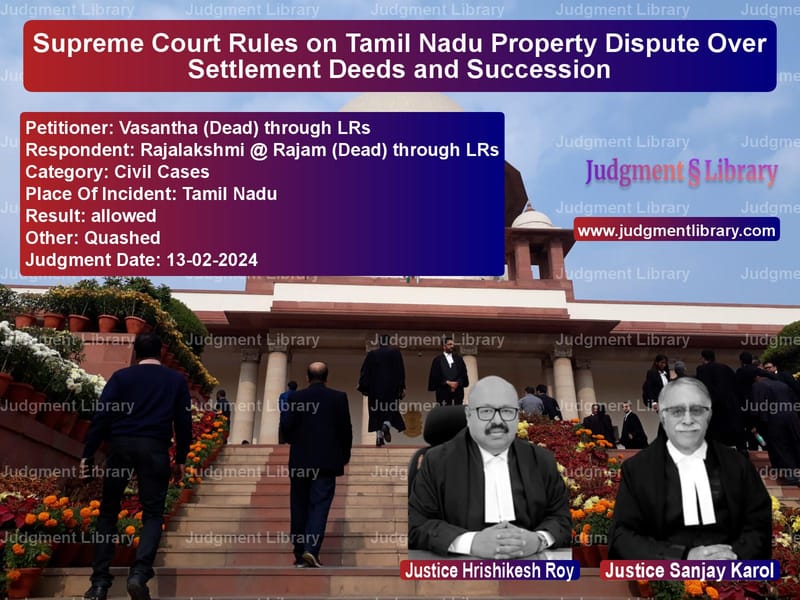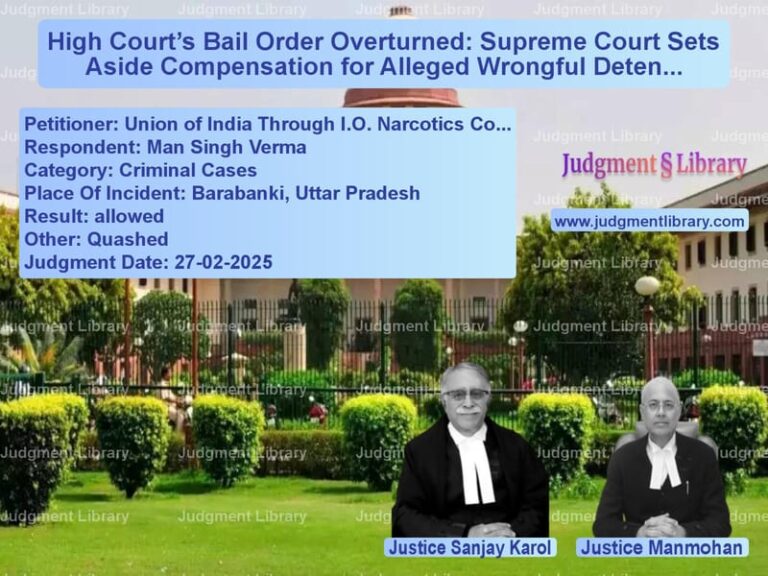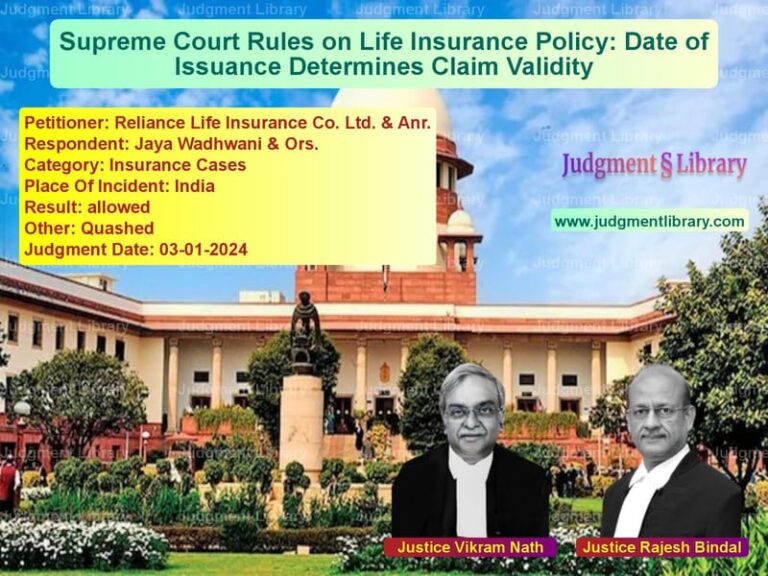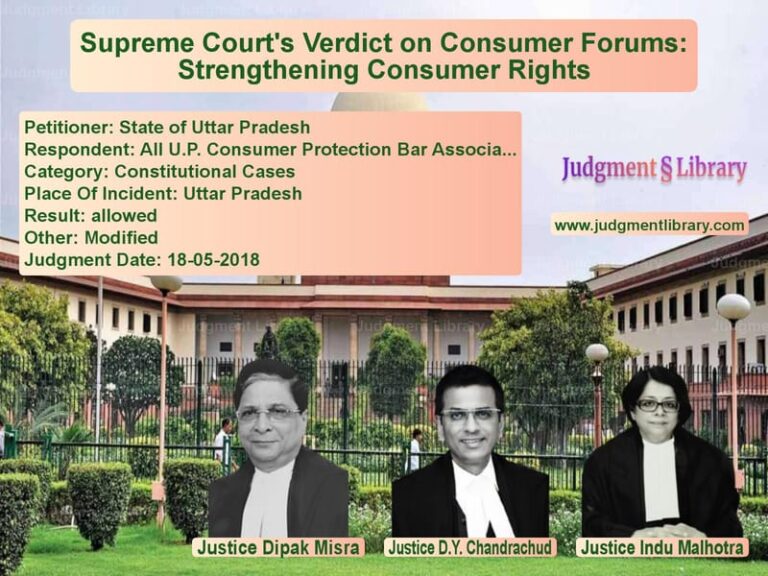Supreme Court Rules on Tamil Nadu Property Dispute Over Settlement Deeds and Succession
The Supreme Court of India recently delivered a crucial judgment in a long-standing property dispute involving multiple generations of a Tamil Nadu family. The case revolved around the validity of settlement deeds executed between 1947 and 1952, with claims from different heirs over property rights. The judgment has significant implications for property inheritance laws, succession, and the doctrine of limitation in civil disputes.
Background of the Case
The legal battle started in 1947 when Thayammal, a widow, executed a settlement deed transferring property to her two sons—Raghavulu Naidu and Munusamy Naidu—while also granting certain rights to her daughter, Saroja. This was followed by a series of subsequent settlement deeds, including one executed in 1952 that revoked earlier transfers. Saroja, however, passed away in 1951, leading to competing claims over the property between her heirs and those of her brothers.
In 1993, Gopalakrishnan, the husband of Saroja, filed a suit claiming his vested rights in the property as per the first settlement deed. The case went through multiple levels of the judiciary before reaching the Supreme Court.
Trial Court Proceedings
The trial court analyzed the validity of the settlement deeds and whether Gopalakrishnan had a right to claim the property. It framed four key issues:
- Whether the first settlement deed of 1947 was valid?
- Whether Gopalakrishnan could claim rights over the property?
- Whether his suit for declaration of ownership was maintainable?
- What relief, if any, was Gopalakrishnan entitled to?
The trial court ruled that although the 1947 deed was genuine, Gopalakrishnan had failed to challenge subsequent transactions for decades. The suit was deemed barred by limitation.
First Appellate Court Findings
In 2002, the First Appellate Court upheld the trial court’s ruling, affirming that:
- Gopalakrishnan had taken no action to challenge the subsequent settlement deeds executed after 1947.
- The limitation period to claim rights had expired.
- The claim of adverse possession against Gopalakrishnan was justified.
High Court’s Ruling
The Madras High Court, however, took a different view in 2012, ruling that:
- The first settlement deed had created vested rights in favor of Saroja.
- Gopalakrishnan, as her legal heir, retained a valid claim over the property.
- The claim was not barred by limitation as the right to possession had not fully materialized until later.
This decision was then challenged in the Supreme Court.
Supreme Court’s Analysis and Judgment
The Supreme Court considered two key legal questions:
- Whether Gopalakrishnan’s suit for declaration was barred by limitation?
- Whether a suit for mere declaration without seeking possession was maintainable under Section 34 of the Specific Relief Act, 1963?
The Court ruled:
“The right to sue accrues when the first adverse claim is made. Since Gopalakrishnan failed to challenge subsequent transactions for several decades, the suit is barred by limitation.”
The Supreme Court also emphasized that under Section 34 of the Specific Relief Act:
“A declaratory suit is maintainable only if no further relief is necessary. If possession is in dispute, the plaintiff must seek both declaration and possession.”
As Gopalakrishnan had not sought possession, his suit was deemed legally unsustainable.
Final Judgment and Legal Implications
The Supreme Court set aside the High Court’s ruling and restored the decisions of the trial court and the First Appellate Court. It reaffirmed that:
- Gopalakrishnan’s suit was time-barred.
- His failure to challenge previous transactions over the years weakened his case.
- The relief sought was incomplete, making the suit untenable.
The ruling underscores the importance of acting within prescribed limitation periods in property disputes and ensuring that all necessary reliefs are sought in legal proceedings.
Conclusion
The Supreme Court’s decision provides clarity on property rights, inheritance laws, and the doctrine of limitation. By dismissing a long-standing claim, the Court reinforced the principle that legal remedies must be pursued in a timely manner. This case serves as a critical reference for future disputes involving settlement deeds and inheritance rights.
Petitioner Name: Vasantha (Dead) through LRs.Respondent Name: Rajalakshmi @ Rajam (Dead) through LRs.Judgment By: Justice Hrishikesh Roy, Justice Sanjay Karol.Place Of Incident: Tamil Nadu.Judgment Date: 13-02-2024.
Don’t miss out on the full details! Download the complete judgment in PDF format below and gain valuable insights instantly!
Download Judgment: vasantha-(dead)-thro-vs-rajalakshmi-@-rajam-supreme-court-of-india-judgment-dated-13-02-2024.pdf
Directly Download Judgment: Directly download this Judgment
See all petitions in Property Disputes
See all petitions in Succession and Wills
See all petitions in Specific Performance
See all petitions in Judgment by Hrishikesh Roy
See all petitions in Judgment by Sanjay Karol
See all petitions in allowed
See all petitions in Quashed
See all petitions in supreme court of India judgments February 2024
See all petitions in 2024 judgments
See all posts in Civil Cases Category
See all allowed petitions in Civil Cases Category
See all Dismissed petitions in Civil Cases Category
See all partially allowed petitions in Civil Cases Category







